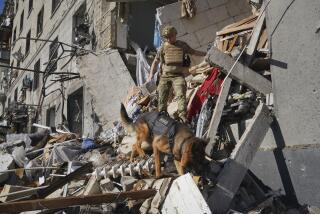Bush Makes Tough Statement but Pulls His Punches
- Share via
WASHINGTON — At a time when the White House is under pressure to produce specific justifications for an invasion of Iraq, President Bush provided scant new information on Saddam Hussein’s pursuit of weapons of mass destruction and carefully avoided claims, made by others in his administration, of links between Iraq and the Al Qaeda terrorist network.
Bush’s speech before the United Nations on Thursday was his most forceful argument yet for ousting a dictator accused of possessing or pursuing chemical, biological and nuclear weapons.
“In one place, in one regime, we find all these dangers in their most lethal and aggressive forms--exactly the kind of aggressive threat the United Nations was born to confront,” Bush said.
But at a time when some in the White House have been accused of grasping for a pretext for an invasion, Bush presented a relatively conservative case based on widely accepted intelligence findings.
“There was nothing surprising,” said Terence Taylor, head of the Washington office of the International Institute for Strategic Studies. “The focus of his speech was to lay out a detailed record of how year after year the Iraqi regime has flouted the U.N.”
Intelligence officials and Iraq experts said they found little to quibble with in Bush’s speech and an accompanying 21-page “white paper” documenting Iraq’s violations of U.N. resolutions. And Bush appeared to steer clear of some of the more contentious assertions made recently by others in his administration.
For example, Bush said that Hussein continues to pursue nuclear weapons, but he stopped short of Vice President Dick Cheney’s recent claim that Iraq would have them “fairly soon.”
And while he noted that some Al Qaeda members had fled from Afghanistan to Iraq, Bush did not claim any deeper connection between Hussein and the terrorist network. In particular, he did not even mention reports--backed by some White House officials but viewed with skepticism by the CIA--that Sept. 11 hijacker Mohammed Atta met an Iraqi agent in the Czech Republic capital of Prague last year.
Experts said Bush’s speech appeared to be calibrated to make a compelling case without opening the administration to criticism that it is ginning up evidence for a war opposed by many European leaders and some prominent members of Congress.
“I think the president was being very careful to avoid getting into a food fight over the reliability” of the evidence against Hussein, said a former CIA official with extensive experience in Iraq.
The white paper, titled “A Decade of Deception and Defiance,” contained dozens of specific allegations against Iraq, stretching back to Hussein’s unleashing of chemical agents on Iraq’s Kurdish minority during the 1980s.
But items that may be the result of fresh intelligence tended to be couched in vague language, making their significance difficult to assess.
In one instance, Bush said Iraq “retains physical infrastructure needed to build a nuclear weapon.” That would appear to depart from the findings of the Vienna-based International Atomic Energy Agency, which directed inspections and disarmament of Iraq’s nuclear programs from 1991 to 1998. The agency’s reports indicate that all known factories and facilities used by Iraq for its clandestine nuclear weapons program were destroyed in the 1991 Persian Gulf War or in subsequent IAEA raids.
Recent satellite photographs have shown new construction at sites previously used for Iraq’s nuclear program, including the Al Tuwaitha Nuclear Research Center, but U.N. and U.S. officials say they do not know what is in or under the buildings. U.N. weapons inspectors withdrew from Iraq in 1998, just before a punitive bombing campaign by U.S. and British forces, and were not permitted to return.
Bush, echoing recent reports, said Iraq has sought to buy thousands of specially designed aluminum tubes that could be used to enrich uranium. He also said that Iraq employs “capable nuclear scientists” and would be able to build a nuclear weapon within a year if it were able to acquire fissile material--something experts believe it is not close to achieving.
Bush said that Iraq is expanding and improving facilities that were used to produce biological weapons before the Gulf War, and others that are capable of producing chemical weapons.
These claims are consistent with reported findings of intelligence officials and independent experts.
More to Read
Sign up for Essential California
The most important California stories and recommendations in your inbox every morning.
You may occasionally receive promotional content from the Los Angeles Times.














